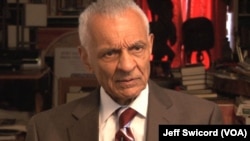The Reverend C.T. Vivian, an icon of the U.S. civil rights movement, says boxer Muhammad Ali’s conversion to Islam reinforced the movement’s commitment to equal opportunity and nonviolence.
Ali was beloved by some and maligned by others for his refusal to enter the military during the Vietnam War, his opposition to integration during the civil rights movement in the 1960s and his conversion from Christianity to Islam.
Some of Ali’s actions during the civil rights era provided “a very important strengthening of what we were talking about,” said Vivian, who in 2013 was given the Presidential Medal of Freedom, America’s highest civilian honor.
“Remember, it was a religious movement. He found his faith and he lived it. And that was the wonderful part,” Vivian said in an interview with VOA.
Vivian, 92, was a close ally of the Rev. Martin Luther King Jr. He was a national leader of the Southern Christian Leadership Conference, an African-American civil rights group that traces its roots to the Montgomery Bus Boycott in Alabama in 1955, after Rosa Parks' arrest for refusing to give up her seat on a bus to a white man. It was a seminal moment in the civil rights movement, a lengthy struggle to eliminate segregation and discrimination.
Like Vivian, most African-Americans who were involved in the civil rights movement were Christians. He said leaders of the movement “had no real problems with the fact that [Ali] didn’t go Christian.”
Spiritual element
Vivian said Ali’s public demonstrations of his Muslim faith were beneficial to the civil rights movement and beyond. “Any attention brought to the spiritualizing of life is very, very important,” he said.
After winning the world heavyweight championship in 1964, Ali announced he had become a member of the Nation of Islam, an African-American Islamic group founded in Detroit, Michigan, in 1930. Ali converted in the 1970s to Sunni Islam, the largest denomination among Muslims worldwide.
“He's beloved because he promoted tolerance, he promoted peace, he promoted brotherhood and sisterhood of humanity ... a result of him embracing Sunni Islam,” Greg Carr, chairman of Howard University’s Afro-American Studies Department, said in an interview with VOA.
Over time, Ali began gaining universal respect for standing firm on his anti-war principles. He was arrested, convicted, stripped of his championship titles and barred from boxing for nearly four years for refusing to enter the military for religious reasons. The Supreme Court overturned his conviction in 1971, but by then he had sacrificed the prime of his boxing career and millions of dollars in potential earnings.
After his retirement, Ali was diagnosed with Parkinson’s disease, a physically debilitating illness that for more than 30 years steadily robbed one of the world’s most recognizable people of his outgoing personality, verbal prowess and exceptional athleticism.








